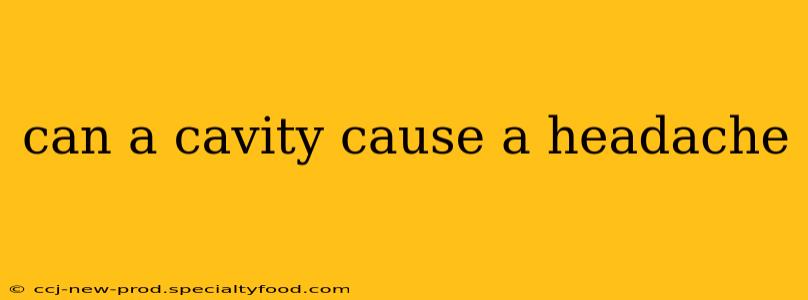Yes, a cavity can indeed cause a headache, although it's not the most common cause. The pain associated with a cavity can radiate and trigger headaches, particularly in the areas around the jaw, temples, and forehead. This isn't a direct, nerve-related headache like a migraine, but rather a referred pain stemming from the intense discomfort of the tooth decay.
How Can a Cavity Cause a Headache?
The connection between cavities and headaches lies in the intricate network of nerves in your head and face. A cavity, essentially a hole in your tooth caused by tooth decay, exposes the sensitive dentin and pulp (the inner part of the tooth containing nerves and blood vessels). When the decay reaches a certain point, even minor stimuli like temperature changes (hot or cold foods/drinks), pressure, or sweets can trigger sharp, throbbing pain.
This intense pain is transmitted through the trigeminal nerve, a major cranial nerve responsible for sensation in the face, including teeth and gums. This nerve's branches extend widely, reaching areas of the head that can manifest as headache pain. Think of it like a ripple effect: the initial pain originates in the tooth, but the nerve signals spread to other regions, leading to a headache.
What Type of Headache Can a Cavity Cause?
The headache associated with a cavity isn't usually a classic migraine or tension headache. Instead, it's often described as a dull, throbbing ache, or a sharp, intense pain localized to one side of the head, often near the jaw or temple on the same side as the affected tooth. The pain may be constant or intermittent, worsening with certain triggers like chewing or biting.
Is the Headache Always on the Same Side as the Cavity?
Typically, yes, the headache will be felt on the same side of the head as the problematic tooth. However, the intensity of the pain and the area affected can vary depending on the severity of the cavity and the individual's sensitivity.
How Can I Tell if My Headache is from a Cavity?
Differentiating between a headache caused by a cavity and other types of headaches can be tricky. Look for these key indicators:
- Localized Pain: The pain is usually concentrated on one side of the head, often near the jaw or temple.
- Tooth Sensitivity: You might experience heightened sensitivity in a specific tooth to hot, cold, sweet, or pressure.
- Pain While Chewing or Biting: The pain intensifies when you chew or bite on the affected side.
- No Other Headache Symptoms: Unlike migraines, you may not experience nausea, vomiting, or visual disturbances.
If you suspect a cavity might be causing your headache, seeing a dentist is crucial. They can diagnose the problem accurately and provide appropriate treatment.
Can a Filling or Root Canal Prevent Headaches Caused by Cavities?
Absolutely! Dental treatments like fillings or root canals effectively address the underlying cause of the pain—the cavity itself. A filling repairs the decayed area of the tooth, protecting the pulp and reducing the chances of future pain and associated headaches. A root canal becomes necessary when the infection has reached the tooth's pulp; it removes the infected tissue and seals the tooth, eliminating the source of pain. Both procedures can significantly alleviate or prevent headaches related to cavities.
When Should I See a Dentist?
Don't delay seeking professional dental care if you suspect a cavity is causing your headache. Early intervention can prevent the problem from worsening and save you from more extensive, and potentially more costly, treatments down the line. Regular dental check-ups are also vital for early detection and prevention of cavities.
Disclaimer: This information is for general knowledge and does not constitute medical advice. Always consult with a qualified healthcare professional for diagnosis and treatment of any medical condition, including headaches and dental problems.
